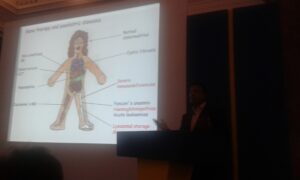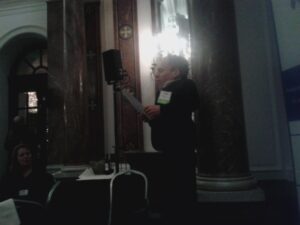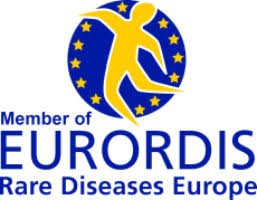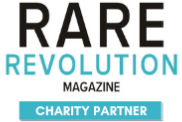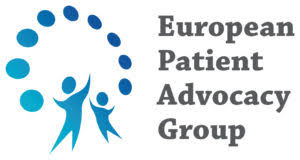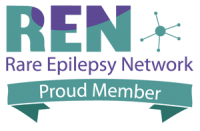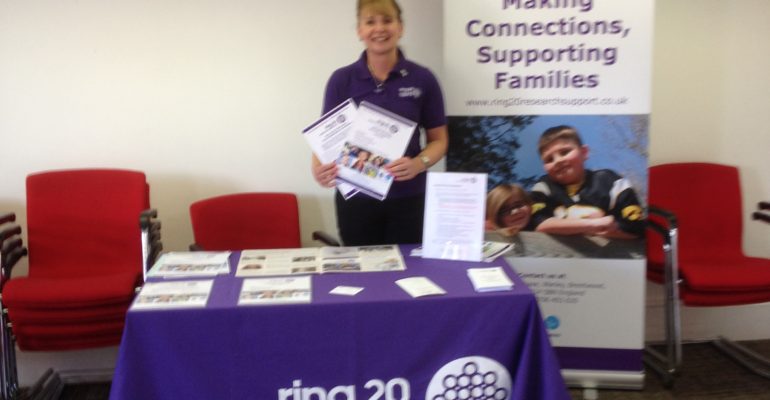
ESNA – JUNE 2016, MANCHESTER
Allison went along to the Epilepsy Specialist Nurse Association Annual conference in Manchester to meet with 80 ESN’s from around the UK, to find out what they knew about r(20) and see if they had any patients in their care. It was quite a mixed bag in terms of those who had and had not heard of r(20).
All delegates were provided with our signs and symptoms list and r(20) leaflet about the support group in their delegate packs and I took time to chat to them about sharing this information with the colleagues. It was a privilege to hear Prof Sanjay Sisodiya speak about genetics and epilepsy and how understanding more about genetics causes will help to treat patients better in the future. There were also interesting presentations on women and childbearing with epilepsy and also driving regulations for those who have seizures.
One of the key reasons for attending was to promote our r(20) Activists campaign, so I gave out lots of our posters which should be appearing in an epilepsy clinic near you soon! However, there will be areas of the UK that I missed, or weren’t represented at the conference, so please do try and take some posters along to your local hospital/clinic when you next attend for a routine appointment and help spread the word.
Website:: http://www.esna-online.org.uk/esna-conference-manchester-19th-and-20th-june-2016/
ECRD – MAY 2106, EDINBURGH
Don attended this important event. Here’s what he had to say:
Rare Connect Community – It was good to meet with Robert Pleticha who has been instrumental in helping us set up our own profile and connections across Europe with this incredibly powerful and professional platform. We have now managed to connect with personal stories and medical professionals through multiple translations and share with like minded advocates, researchers, families, individuals all across Europe. This community has the capacity to become an international resource hub and lead to many more families, institutions and medical professionals with a common interest in r(20) A good number of you have already contributed to this resource and eminent groups from France and Italy have recently connected check out the link here to see what’s happening https://www.rareconnect.org/en
BPSU – Richard Lynn Scientific Director
Don had the chance to spend time in discussion with Richard Lynn from BPSU again and talk around the opportunities for potential r(20) questions to be included on the survey panel that is circulated amongst the entire UK paediatric community. It enabled Don to get a better understanding of the purpose of the unit, how it works and the considerations that the advisory board are looking for in terms of patient related outcome experiences and patient related outcome measures. For example, if we are seeking an independent study? or to have specific questions included as part of a general epilepsy panel related to rare disease, intractable epilepsy monitoring/testing.
OpenAPP – patient registry
Both Professor Cross and Richard Lynn suggested the requirement for a patient registry for r(20) which we do not yet have – and Don was able to meet with a new provider of such a tool who was exhibiting at the conference called Open APP.
Rare diseases are highly heterogeneous. International interoperable registries are particularly important for rare diseases. They bring together a small patient population which can be used to initially complete a natural history of the disease and then engage with academia and pharma companies. Patient Registries, ultimately, improve the quality of life of patients. Registries allow clinicians to discover the best care path for a disorder and then measure patient progress along that care path. Patient registries constitute key instruments for the development of natural history studies, the improvement of patient care, healthcare planning and quality of life outcome – “If it can be measured, it can be managed.”
This tool has been developed by a team in Ireland and we now have the project details that we will be discussing at the next trustee meeting in early July before circulating to members shortly. The good news is its FREE development for up to 100 first cases! To sustain anything beyond that number will require funding which we will apply for in due course.
Birmingham Children’s Hospital Rare Disease Centre
Had the opportunity to share with Dr Larissa Kerecuk who is Rare Disease Lead and Consultant Paediatric Nephrologist at Birmingham Children’s Hospital. She has welcomed the opportunity of sharing these tremendous new facilities with our patient group for conferences, or meetings you can see the scope of the facility here http://www.bch.nhs.uk/news/article/14103-hospital-unveils-images-brand-new-%C2%A3375million-clinical-block
I was also able to obtain some valuable learning for our group by attending 3 days of programme presentations covering a wide variety of topics like:
- Research Ethics
- Establishment of European Reference Networks (ERN) model for rare diseases
- Social Innovation for better care for rare diseases
- Patients empowered in research & diagnosis
- Breaking through in diagnosis
- The impact of social media on globalisation: new knowledge and advocacy
- Boosting rare diseases in a global collaborative research environment
- Patients need accurate diagnosis
We can give all our members access to any of these presentations, so if you are interested in further details please contact Allison Watson.
Website:: http://www.rare-diseases.eu/
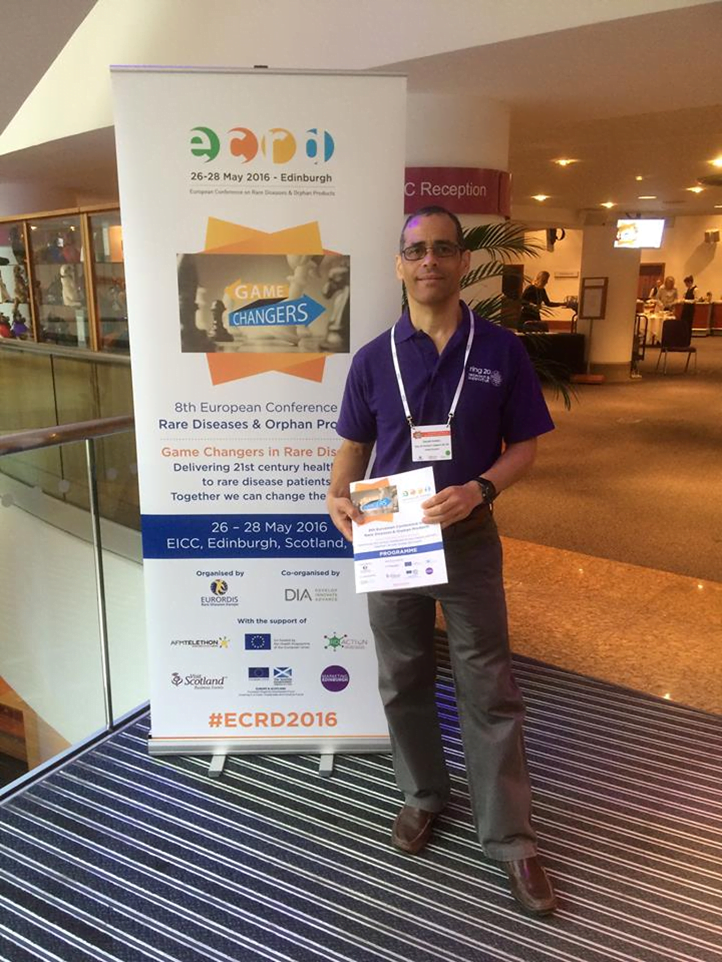
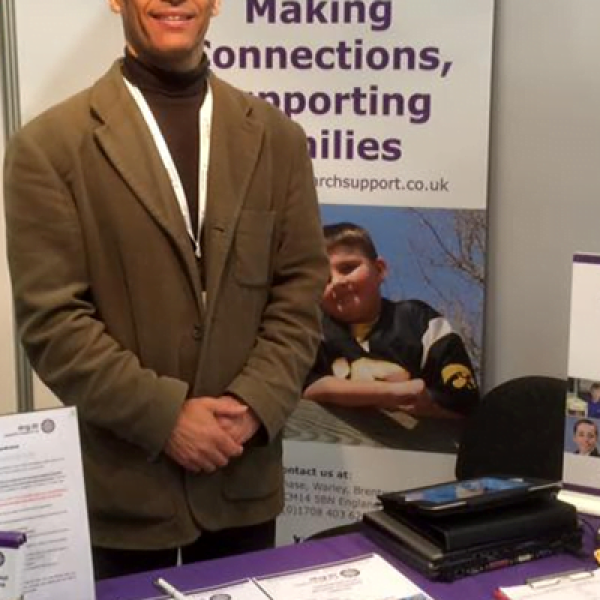
RCPCH – APRIL 2016, LIVERPOOL
Don had the opportunity of attending two events so far this year on behalf of our charity to raise awareness and learn more about building bridges and our capacity in order to achieve some of our core aims and objectives. The first was meeting was one that Professor Helen Cross and our medical adviser Sophia Varadkar both agreed would enable us to reach the paediatric community.. This group of medical professionals are the group that get to see young children presenting with seizures. At this point we all know how important being able to rule out r(20) at an early stage is, or make being able to give an accurate diagnosis in order to avoid potentially unnecessary treatments. Until now we have never had the opportunity to reach out to this group.
Reading recent case histories from Callum’s and Tilly’s patient stories reinforces the importance of getting early knowledge and interventions in this area to as many institutions as possible in order to pick up the undiagnosed and identify future diagnoses. If we go some way towards achieving this through our presence at these conferences many more cases will be picked up and in turn grow the r(20) community and the capacity for research and action.
One key insight Don discovered from talking with this group was that paediatricians in the UK do not get to see EEG’s as part of their clinical evaluations, so they would not be able to pick up any irregularities in this data. Recent research from the French Epileptologist Arnaud Biraben’s abstract points towards a distinctive EEG pattern in r(20)
Don was able to engage with a good number of paediatricians from all over Europe (some at the is event and
Key Connections –
British Paediatric Surveillance Unit (BPSU) – Don was fortunate to meet with the research director Richard Lynn and sat in on their presentation. They can survey the whole, or segments of the paediatric community with a quarterly survey that look at the following:
- The condition – natural history – when does it present?
- The test – is it adequate, consistent, adequate, accessible?
- The intervention – does it make a difference, is there any delay?
- The screening programme?
- Implementation procedure p when does treatment begin?
Being able to put r(20) on this map would have significant impact from an awareness and registry perspective. Also provide valuable reporting data for future potential diagnosis and treatment protocols, as well as research opportunities. Watch this space!
BPNA – JANUARY 2016, SHEFFIELD
Following our medical advisor, Sophie’s recommendation and introduction, Allison and David hosted a stand at the annual British Paediatric Neurology Association conference (BPNA) in Sheffield, held over 3 days. We arrived by train late the night before, ready for a prompt 9am start—travelling light to be able to carry all the stand essentials, plus David’s ketogenic meals for 2 days! All the charity stands were located in a side hall and the first day was comparatively quiet compared to previous events, as many delegates grabbed a coffee in the main hall between heading off to the various talks. Still we had some interested visitors to our stand and come the next morning, almost a rush at morning tea break! Its great getting to speak with Paediatric Neurologists from all over the UK some who have/have not heard of r(20) and being able to share our information leaflets on diagnosis and signs and symptoms to recognise the syndrome. We hope this face to face engagement continues to raise awareness and will help more patients obtain a diagnosis and be advised of our support group.
The highlight of the meeting was meeting Dr Archana Desurkar from Sheffield Hospital who expressed a keen interest in r(20) having just diagnosed a new r(20) patient herself. She has kindly offered to help us with our research in identifying more r(20) cases around the UK.
Encounters with health professionals such as Archana, as well as liaison with other epilepsy related charities, helps to strengthen our support group and makes these events so worthwhile to attend.
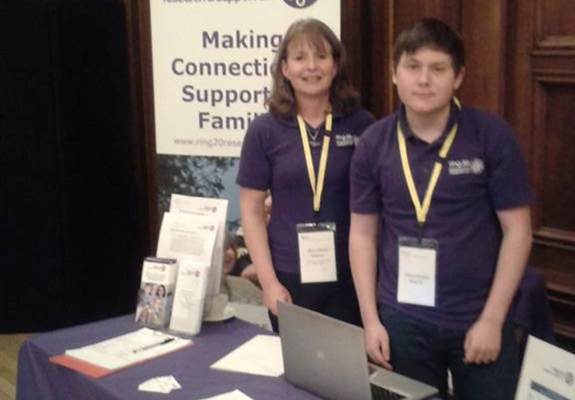
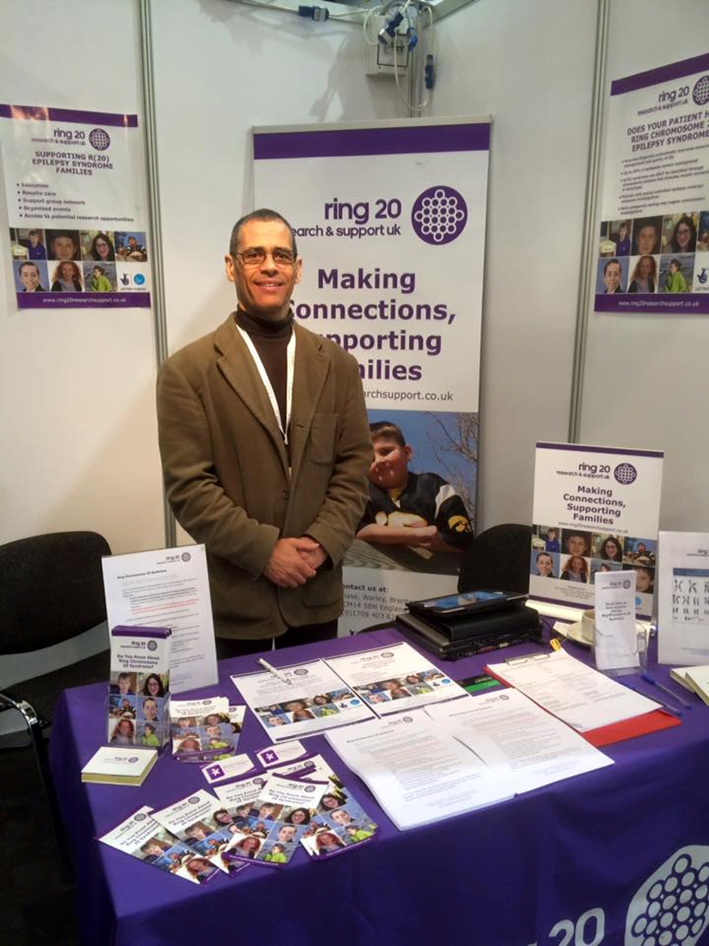
ESHG CONFERENCE GLASGOW, JUNE 2015
As I write this update for this particular conference it struck me how quickly time has passed over the past decade and my personal involvement with r(20) syndrome . I mention this only in context of the number of meetings, conferences, family visits, conversations and engagement with many professionals around the world over the years. Certainly as part of this new team and the new organisation (Research Support UK) I sense a new chapter has begun. There is no doubt in my mind that this particular opportunity was very important in helping to establish new connections with a significant group of professionals we have previously not engaged with.
I know from past experience how costly outreach to professionals can be and our successful application to the Big Lottery Fund to enable this outreach has been a terrific shot in the arm for Ring 20 Research Support UK. We received funding to attend two conferences of which this was the largest.
There are so many factors involved in attending these events – many hours of preparation producing updated literature, stand materials, transportation and that’s before the event actually begins. This particular event was held across four days and hosted over 2,000 delegates from over 40 different countries. In fact, I recorded speaking with delegates from 26 countries from all four corners of the globe, not just Europe.
I could spend lots of column inches telling you about the many conversations I shared (I did share some on twitter and face book )but wanted to try and give you the highlights here.
One of the interesting features of events like this is you do have time to learn from other charities trying to do much the same thing and what works for them. That said, the main highlights were talking to geneticists, clinicians and counsellors who were testing for rare disorders some of whom were familiar with r(20) and of course those who were not. Interestingly I talked with one of the lead research team who was involved in a abstract research paper that documents 5 cases of r(20) a number of years ago from Holland – D Lindhout Professor of Medical Genetics. He suggested some different avenues for research moving forward which I have passed on to our medical advisor Sophia Varadker. I also connected with the geneticist from Iceland who recently diagnosed the first known set of twins with r(20) who took our literature to pass on to the family and colleagues.
Dr Jean Charles Hoda from Switzerland is setting up a foundation to help identify rare diseases and he had never heard of r(20) so I am following up to make sure we are represented in that endeavour. Geneticists from Austria and Slovakia have suspected cases and look to do more testing to rule out r(20). A team from Oxford had not heard of r(20) and were pleased to take away more information (and enquire if we were available to speak at their institution) as were a good number of other individuals from the UK and abroad. All those professionals that completed our stand questionnaire are being followed up be me personally, which will help us to further improve levels of diagnosis and awareness.
I personally learned more from interacting, observing and listening to individuals and groups at this event. Only when you attend major events like this do you get a idea of the scale of our mission and need for increased awareness, more understanding about the condition and the best way to help improve outcomes for families. I consider it a privilege to be part of this endeavour and look forward to sharing more and keeping everyone informed.
1ST ANNUAL GENETIC DISORDERS LEADERSHIP SYMPOSIUM REPORT BY ALLISON
At present in the UK, there is great flux in all aspects of the lives of families affected by a genetic disorders. The NHS is undergoing major changes in its core structure, the benefits system is becoming more difficult to access and the new Children and Families Act 2014 will completely overhaul the way children with special needs access educational support at school. All of this change is taking place alongside advances in the science of diagnosis and the availability of treatments for genetic disorders, making it essential for those affected to better understand how the world is changing so that they can be more knowledgeable and more effective advocates.
The goal of the 1st Annual Genetic Disorders Leadership Symposium is to bring together leaders of UK based genetic disorder charities and other patient advocates to create an environment in which they can learn from experts, share best practices and network. It is of critical importance to help those advocates affected by genetic disorders ‘stakeholders in their own care’, and this Annual Symposium is set to address these and other important topics in a first of it’s kind collaborative event.
Genetics Disorders UK and Global Genes were the collaborative event organisers. They explained that there are 7,000 rare diseases with 1 in 17 people affected in the UK. The number of people affected by rare disease is more than cancer and AIDS combined. 75% affect children, of which 30% die before their 5th birthday, which is truly shocking. This is why it is important to get rare disease on the political agenda as cancer and recently mental health has been, so that more funding and importance is given to those affected. In bringing together rare disease support groups the hope is that collectively we have a single louder voice to be heard and effect change.
My mentor Lesley (fro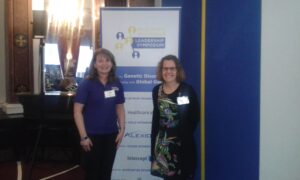 m the AKU Society – pictured left) advised me of this event and what an event it was!
m the AKU Society – pictured left) advised me of this event and what an event it was!
The event started out over dinner on the Friday evening, with nearly 100 delegates representing rare disease support groups/organisations, just like ourselves. We were all seated according to plan – but that was only to 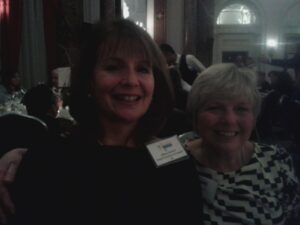 start with! I was lucky enough to be seated next to Beverly Searle from Unique with whom I’ve had a number of conversations, so it was lovely to meet and speak with her in person. Unique have been instrumental in helping us establish ourselves in our first year and recently updated their information leaflet on r(20) syndrome (which you can find on our Knowledge Base page).
start with! I was lucky enough to be seated next to Beverly Searle from Unique with whom I’ve had a number of conversations, so it was lovely to meet and speak with her in person. Unique have been instrumental in helping us establish ourselves in our first year and recently updated their information leaflet on r(20) syndrome (which you can find on our Knowledge Base page).
Our guest speaker for the evening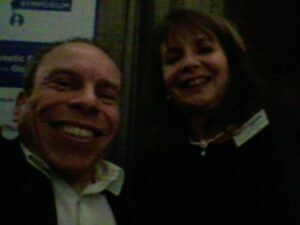 was Warwick Davis, a truly entertaining gent, who spoke about aspects of his life story with humour and emotion! After each course we were told to move around the room, so that we enjoyed the opportunity to meet with a number of the other delegates. I was lucky enough to sit next to Warwick for my main course and he told me how he and his wife had setup Little People UK; it was as a result of people with dwarfism, who having seen Warwick on screen, had got in touch with the couple as they wanted to engage with others like themselves, affected by the same rare disease. Warwick and his wife went out of their way to meet with these people to offer mutual support, but after a while realised that they needed to formalise something or they would spend their free time travelling up and down the country. So they formed Little People UK and now the members meet annually in the UK and with others in the US too. Of course, I had to get a selfie with Warwick!
was Warwick Davis, a truly entertaining gent, who spoke about aspects of his life story with humour and emotion! After each course we were told to move around the room, so that we enjoyed the opportunity to meet with a number of the other delegates. I was lucky enough to sit next to Warwick for my main course and he told me how he and his wife had setup Little People UK; it was as a result of people with dwarfism, who having seen Warwick on screen, had got in touch with the couple as they wanted to engage with others like themselves, affected by the same rare disease. Warwick and his wife went out of their way to meet with these people to offer mutual support, but after a while realised that they needed to formalise something or they would spend their free time travelling up and down the country. So they formed Little People UK and now the members meet annually in the UK and with others in the US too. Of course, I had to get a selfie with Warwick!
After a busy evening of eating, drinking and lots of talking we headed for bed as we had an early start for a full agenda the next day!
The first topic of the day was the 100,000 genomes project. The talk was similar to that which Don and I h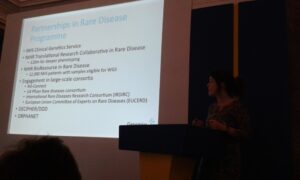 ad heard at the Students4RareDiseases symposium, but slightly more tailored to support groups. It not easy to talk about human genes in laymans terms to the likes of an audience such as us, but Dr Clare Turnbull gave it a good shot. The project looks at 100,000 human genome specimens using whole genome sequencing (WGS). Half of the subject relate to cancers and half to rare diseases. For each phenotype (disease group e.g. epilepsy) there will be 3 subjects, so in total less than 17,000 cases of rare diseases will be studied in this round. A huge amount of money has been spent on new buildings, sequencing machines that are faster and cheaper and a large number of professionals that support the project including researchers. Typically, when a genetic disorder is suspected, specific tests are requested by the medical team, some of which can take a large amount of time or money. The difference with WGS is that the whole genome can be tested for any genetic disorder to be detected, so improving chances for accurate diagnosis and ht ability for researchers to learn more about the disorders.
ad heard at the Students4RareDiseases symposium, but slightly more tailored to support groups. It not easy to talk about human genes in laymans terms to the likes of an audience such as us, but Dr Clare Turnbull gave it a good shot. The project looks at 100,000 human genome specimens using whole genome sequencing (WGS). Half of the subject relate to cancers and half to rare diseases. For each phenotype (disease group e.g. epilepsy) there will be 3 subjects, so in total less than 17,000 cases of rare diseases will be studied in this round. A huge amount of money has been spent on new buildings, sequencing machines that are faster and cheaper and a large number of professionals that support the project including researchers. Typically, when a genetic disorder is suspected, specific tests are requested by the medical team, some of which can take a large amount of time or money. The difference with WGS is that the whole genome can be tested for any genetic disorder to be detected, so improving chances for accurate diagnosis and ht ability for researchers to learn more about the disorders.
At the break I was able to ask Dr Turnbull whether WGS would pick up ring Chromosomes as we know that certain more detailed genetic tests do not. It was good to hear that she stated it would pick up ring Chromosomes, whereas exome might miss this. However, as epilepsy is a ‘common’ condition and doesn’t always have a genetic basis, there is less likelihood of many epilepsy phenotypes being included in the 1st round of studies. Maybe hope for the future?
Next we heard about specialised commissioning in the NHS followed by presentations from 3 support groups on how they had successfully put together patient information booklets. I brought away some examples as this is something that families might find useful for r(20) syndrome in the future?
Before lunch some very useful information was disseminated to us regarding the new Education and Health Care (EHC) Plans and the findings from the 1st 6 months of implementation. Suffice to say that there is some way to go…If you have a child with a Statement of Educational Needs and/or health issues or indeed have already moved to an EHC you may have had some difficulties? One of the key areas being cited by the speakers was that Section F (Educational Section) of the new EHC should include details of any health issues that affect education/learning and should not just be included in Section B (Health section), as they can’t be challenged so easily. If you need help, there are groups out there to support you/your child obtain the support they need/deserve. SOS!SEN provide support to families going through this process, whilst if you need legal support Maxwell Gillott are specialists in this area. I will add details to our Useful Links organisations should you need to.
Following this Robbie Spence from Disability Rights UK provided lots of useful insights into the changes of DLA into PIP. Their website again is a useful mine of information with free downloadable PDFs and information leaflets that can be purchased for a small sum, which may be of benefit to any disabled person in respect of your rights and entitlement to benefits.
The morning session ended with 4 organisations with services to offer genetic disorder charities and support groups , including Sparks (a research partner programme), GeneAdvisor (rare disease diagnostic testing), Ben’s Friends (online support com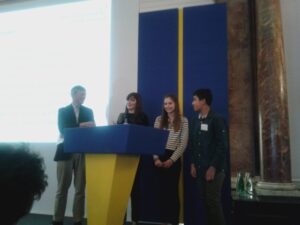 munities) and Healx (novel therapeutic solutions for rare genetic disorders).
munities) and Healx (novel therapeutic solutions for rare genetic disorders).
After lunch Dr Caroline Wright kicked off describing how new genetic sequencing technologies are being used to find novel genetic diagnoses for UK families in the Deciphering Developmental Disorders (DDD) study.
Two different groups then presented how they had approach putting together successful patient registries – something we’d like to have for r(20)! and then just to ensure the delicious lunch didn’t have us napping we were engaged by Dr William van’t Hoff, Head of Clinical Research at Great Ormond Street Hospital (GOSH) and some representatives from the YPAG group – young people who represent the young person’s patient perspective on clinical research studies.
Gene therapy sounds like science fiction, but Prof Bobby Gaspar from GOSH explained how his team have successfully used gene therapy to treat and even cure some rare immune diseases. There is much interest and hope for breakthroughs in this area for others affected by rare diseases in the future.
Our last 3 patient support group presentations were from small charities that have made a big difference. Dr Nick Sireau from the AKU Society explained how he scaled up the work in order to a make a bigger impact for patients – they now how have a centre of excellence in Liverpool and are engaging in clinical trials for a drug that has been repositioned for the purpose. Fiona Copeland from Cilliopathy Alliance talked about how collaboration between patients, researchers and clinicians improves lives for those affected by rare disease and Liz Curtis from the Lily Foundation spoke about how they had brought about a change in legislation to help families affected by mitochondrial disease (you may remember hearing/reading about the recent bill passed allowing 3-parent babies?)
Our final speaker was Stuart Pritchard from Genetic Alliance UK who took us through some facts about the UK Rare Disease Strategy how much progress has been made and what we can expect next.
After a very long and fact-filled day, we said our goodbyes to the many people with whom we had spoken over the 2 days, where new alliances had been forged. The hope is that this will be the first of a regular annual event and I for one, very much hope that this is the case, as so much useful information was shared, which benefits the likes of myself in terms of my own development in the role of Trustee in supporting those affected by r(20) syndrome, but also the families themselves from useful information that can be readily passed on.
I hope you found this news article interesting – do give us your feedback….
Until next time
Allison
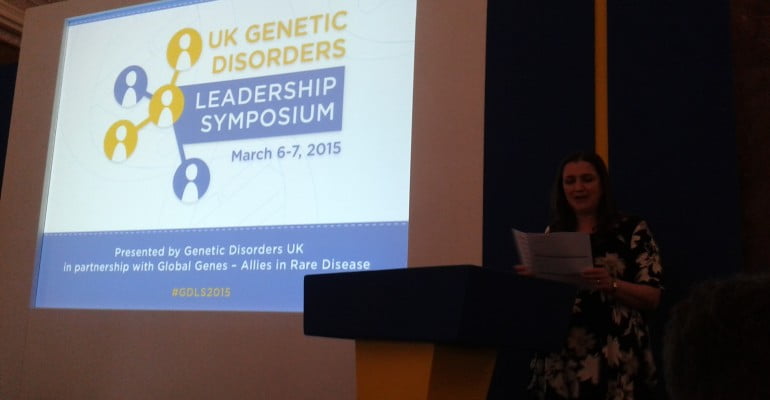
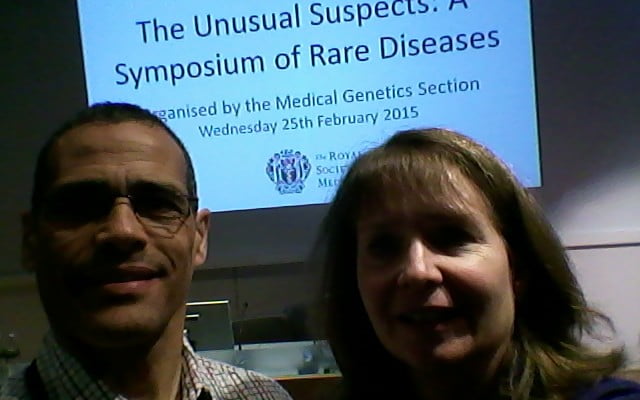
THE UNUSUAL SUSPECTS – A SYMPOSIUM OF RARE DISEASES
In a week of celebrating rare diseases, Don and Allison attended a symposium organised by the Medical Genetics Section of Students4RareDiseases.
The meeting aimed to encourage medical students and trainees to develop understanding and awareness of rare conditions to reduce time to diagnoses. At the end of the meeting, medical students and trainees would be informed about rare diseases that they would not necessarily become familiar with a medical school.
The meeting aims were to:
- Provide an understanding of the genetic basis of rare diseases and appreciate how studying these disorders can inform about common, complex diseases – eg osteoporosis.
- Explore the needs of individuals affected by rare diseases.
- Familiarise participants with the European commitment to help people with rare diseases and develop new bespoke therapies.
The afternoon of presentations was highly informative; the concept behind the syposium (as stated above) being to educate upcoming medical students with an interest in rare diseases with an insight into some of the aspects such as research, issues and the importance of patient support groups. As well as the subject matter being of interest, including a speaker on the curent 100,000 Genomes Project a world-leading research project into cancers and rare diseases being conducted by Genomics England, we were able to engage with representative from Students4RareDiseases and discussed the possibility of a future presentation to medical students on r(20) syndrome at St Barts.
At the end we had time for discussion which presented a useful opportunity to speak with Christine Lavery MBE from The MPS Society. Christine was kind enough to pass on some hints and tips for becoming a succesful rare disease support group – so thank you Christine!
GLOBAL SYMPOSIUM FOR KETOGENIC DIETARY THERAPIES
for Epilepsy and Other Neurological Disorders
We exhibited our brochure and new r(20) flyer for health professionals on the Matthews Friends stand at this important event. Allison attended on the Friday afternoon and also at the Family/Carers Meeting on Sat 11th October where she was able to pick up lots of useful hints and tips on the ketogenic diet and particularly the afternoon session entitled:
Ketogenic Diet with Complex/Drug Resistant Epilepsy in Adults and Children
Chair: Helen Grossi RD – UK
- Using the Ketogenic for Adults; How does it differ? Mackenzie Cervenka MD– USA
- Utilisation & Optimising Use in Different Epilepsy Syndromes Ingrid Scheffer MBBS, PhD – Australia
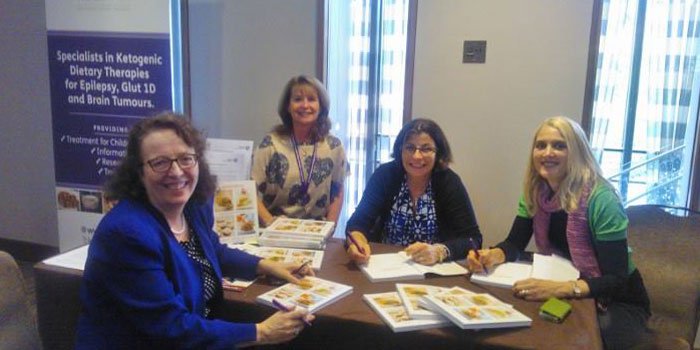
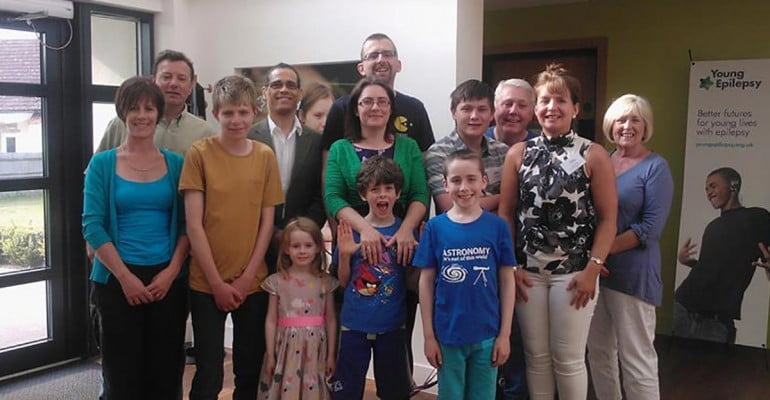
FAMILIES MEETING IN THE UK – MAY 2014
May 2014 saw our first r(20) families meeting, held at Young Epilepsy here in the UK for families affected by the condition.
The meeting was added on to the end of Young Epilepsy’s own Parent’s and Families Information Event, where we exhibited as Ring20 Research and Support UK for the first time.
We met with other parents of children with epilepsy, networked with organisations similar to ourselves, whilst actively participating in the day itself and various workshops on offer.
As there are so few families in the UK (and indeed Europe), we were never expecting a large group for our meet, however we managed 3 out of a possible 5 families attending on the day itself, which is great!
I’m sure more will make it to the next one.
Read more about our Families Meeting (PDF file)
View videos from the meeting
